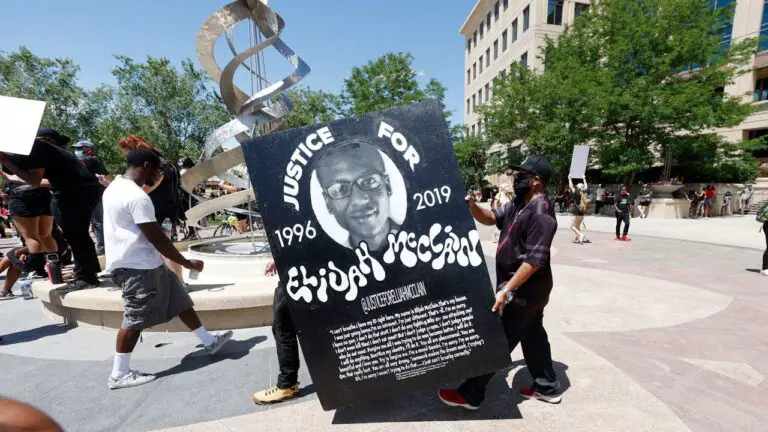<h1 id=”elijah-mcclain-s-tragic-encounter-trial-of-officers-begins”>Elijah McClain's Tragic Encounter: Trial of Officers Begins</h1>
<p>In the summer of 2019, a call to 911 in the Denver suburb of Aurora marked the beginning of a fatal encounter between police and Elijah McClain. The caller described the young Black man as "sketchy," citing his ski mask and raised hands. In reality, McClain was simply walking home from a store, enjoying music. However, within moments, police stopped him, leading to a confrontation resulting in McClain being placed in a neck hold. Subsequently, paramedics administered a sedative, ultimately contributing to his tragic death. McClain, known for his gentle nature, was unarmed and had committed no crime.</p>
<h2 id=”officers-on-trial”>Officers on Trial</h2>
<p>Fast forward four years, and the trial of two officers involved in the incident, Randy Roedema and Jason Rosenblatt, is set to commence. They face charges of manslaughter, criminally negligent reckless homicide, and assault. This trial, expected to last approximately a month, will determine their guilt or innocence. Both officers have pleaded not guilty, yet they have remained silent on the allegations.</p>
<p>Roedema, a former Marine, had been with the department for five years prior to McClain's death, while Rosenblatt had two years of service and was ultimately fired for inappropriate behavior related to the incident. Their defense attorneys, Donald Sisson and Harvey Steinberg, have not provided comments on the case.</p>
<h2 id=”indictment-and-legal-challenges”>Indictment and Legal Challenges</h2>
<p>The officers were indicted in 2021 by a state grand jury following public outcry over McClain's death, which had occurred in the wake of George Floyd's killing. Initially, local prosecutors declined to bring charges, citing difficulty in establishing a direct link between the officers' actions and McClain's death due to inconclusive findings by the coroner's office. However, a revised coroner's report in 2021 attributed McClain's death to complications from the ketamine administered by paramedics and raised the possibility that the officers' restraint might have played a role.</p>
<h2 id=”complex-legal-terrain”>Complex Legal Terrain</h2>
<p>Legal experts suggest that the case against the officers is far from straightforward. The ketamine's role in McClain's death may make it challenging to convince jurors that the officers bear responsibility. The possibility of winning convictions on assault charges, even if causation is unclear, remains on the table.</p>
<p>Jonathan Smith, who contributed to the Aurora investigation, noted that there was no legal justification for the use of force against McClain, except for an instance where officers believed he had reached for a weapon. Body camera footage played a significant role in uncovering the events that transpired, although the cameras dislodged during the encounter, continuing to record audio.</p>
<h2 id=”a-pivotal-moment”>A Pivotal Moment</h2>
<p>The incident unfolded as officers approached McClain on the street, citing his "suspicious" behavior. As they attempted to restrain him, Roedema claimed McClain had grabbed his gun, a statement uncorroborated by video evidence. The three officers acted on this assertion, leading to a sequence of events that culminated in a neck hold being applied, restricting blood flow to McClain's brain. Paramedics administered ketamine, which was then legally permissible for individuals displaying erratic behavior.</p>
<p>Throughout the ordeal, McClain pleaded with the officers, apologizing and explaining himself, but his pleas went unanswered. Days later, he was pronounced dead in a hospital.</p>
<h2 id=”reforms-and-hope-for-change”>Reforms and Hope for Change</h2>
<p>Since 2020, Colorado has banned neck holds for police, and the state's health department has advised against using ketamine on individuals suspected of experiencing excited delirium. Elijah McClain's death has become a rallying point for advocates of police reform, who seek meaningful change in policing practices. His tragic story serves as a stark reminder that police brutality should not be tolerated.</p>
<p>As Candice Bailey, a police reform advocate in Aurora, asserts, "Elijah McClain was a wake-up call for the planet."</p>
Trial begins to determine if Colorado officers are guilty of manslaughter in death of Elijah McClain case

